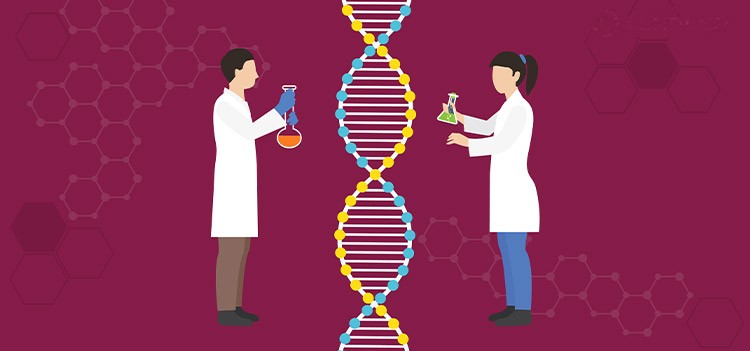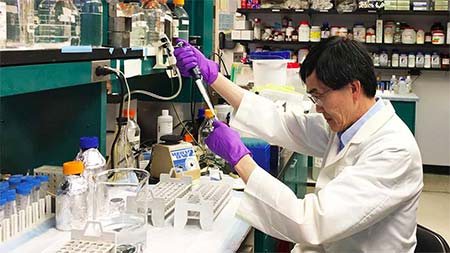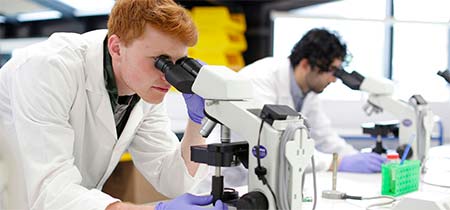Are you interested to learn about the genetic combination of the living organisms?
Are you interested in learning about Genetics or genetic technology?
Read this article to know more!
“Genetics is the field of biology, where we study heredity, genetic variation & genetics in living beings. It is also known as “Science of Heredity”.
What is B.Sc Genetics?
The B.Sc Genetics course deals with a detailed study in the field of genetics of biology. The Genetics is the branch of biology that scientifically studies the genes, heredity and variations in the living organisms. The B.Sc Genetics students will be studying about the various subjects like cell biology, microbial genetics & technology, biostatistics, population genetics, genomic organisation, biochemistry, gene development, DNA technology etc.
The B.Sc Genetics students will be studying in detail the basic units of heredity called genes. The field of genetics explores the concepts and process of heredity, genetic variation and genes in the living organisms. It is also termed as the ‘science of heredity’.
The B.Sc Genetics students typically analyse the genetic structure of the living organism. It has been quite long where the field of genetics is making some news. Many researchers are conducting research at the gene levels to find out solutions to various diseases that are caused to humans. The advancement of science has fuelled the efforts of these researchers and they are coming up with discoveries and innovations.
The students who have studied their PUC or 10+2 with PCB/CBZ are eligible to apply for B.Sc Genetics.
Skills required to join B.Sc Genetics
The students joining B.Sc Genetics should have some important skills to become successful in the field of genetics. They should be passionate about the life sciences and should meet some qualities and skills.
Some of the qualities and skills required to join B.Sc Genetics courses are:
- The students should be capable to use scientific rules and methods to solve the problems on a real-time basis
- The students should be capable to use logic and reasoning to identify the strengths and weaknesses of alternative solutions, conclusions or approaches to the problem
- The students should have the capacity to understand the implications of new information for both current and future problem solving and decision making
- The students should have excellent self-assessment skills and should be fast learners
- The students should have excellent decision-making skills to make quick decisions
- The students should have excellent communication skills
- The students should have excellent interpersonal skills
- The students should be born problem-solvers
- The students should have excellent eye and hands coordination
- The students should have an eye to detail
- The students should have good analytical skills
Career Scope for B.Sc Genetics
B.Sc Genetics have excellent job opportunities across different sectors. They are also required across different areas of research. The B.Sc Genetics students can find lucrative career opportunities in the field of biology, biomedical science, material science, molecular biology, gene technology, biotechnology, microbiology etc.
Some of the areas where the B.Sc Genetics are hired are:
- Animal Breeding industry
- Animal Sciences
- Beauty care centres
- Food Processing Industry
- Genetic Testing labs
- Healthcare centres
- Research and Development Firms
- Agricultural Firms
- Biotechnology industries
- DNA Forensics Departments
- Pharmaceutical Industries
Some of the job roles available after B.Sc Genetics are:
- Animal Breeder
- Bio-technician
- Clinical Geneticist
- Cytogenetic Technologist
- Drug Discovery Engineer
- Forensic Scientist
- Genetic Counsellor
- Regulatory Process Manager
How much do the B.Sc Genetics students will be earning?
The average salary of the B.Sc Genetics students will be around 5 lakhs to 8 lakhs per annum. The average B.Sc Genetics fresher will be earning nearly around 4 lakhs per annum. The salary varies from companies and locations. The salary further increases according to the skills and experience gained in the career.
Placement Opportunities
The B.Sc Genetics students are mainly hired in many research organisations and research labs. The advancements in the technology have created more scope and room for the B.Sc Genetics students. They are hired in all the firms that are into gene technology and biotech organisations.
Some of the top recruiters hiring B.Sc Genetics are:
- Teva Pharmaceuticals
- Serum India Pvt Ltd
- Biocon
- Natural remedies
- Bharat Biotech
- Mylan Labs
- Wipro
- Himalaya Drug Company
- Glaxo Smith
- Kemwell Pharma
Conclusion
B.Sc Genetics students are having excellent job opportunities across the globe. With the advancement of gene technology, many companies are investing huge amounts on research and development. Many medicines are being developed to fight against deadly diseases that are caused to humans. The demand for skilled professionals has risen in the last decade and continues to be in place for the next several years. The students who are passionate and interested to know about the gene composition can join the B.Sc Genetics course. They can land in lucrative jobs across the world and at different positions with better salary packages.




